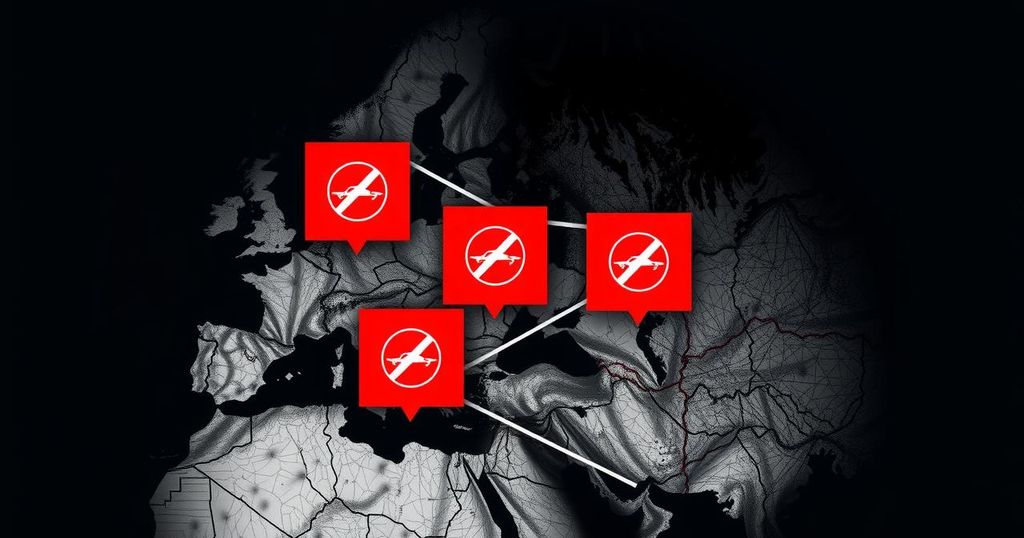Trump Announces Travel Bans for Haiti, Cuba, and Venezuela Amid Immigration Crackdown

President Trump announced a travel ban on Haitian nationals, alongside partial restrictions for Cubans and Venezuelans, as part of an immigration crackdown. The bans are due to perceived security threats and flawed vetting from these countries, affecting entry for many visa categories. Critics argue the policies reflect discrimination and will deeply affect families dependent on U.S. access.
In a significant move this week, President Donald Trump announced travel restrictions for nationals from Haiti, Cuba, and Venezuela, directly impacting immigration processes. The restrictions are part of a broader crackdown on legal immigration and go into effect starting June 9. The proclamation marks the federal government’s intensified measures to manage immigration from these three nations, which are deemed high-risk for security concerns.
The White House proclamation states it will “fully restrict and limit the entry” of Haitian nationals while it will “partially restrict and limit” Cuban and Venezuelan nationals. Specifically, it halts the issuance of most immigrant and non-immigrant visas for individuals from these countries. This means that individuals seeking to enter the U.S. for various purposes such as tourism, education, or business will face barriers, starting next month, except for those with valid visas.
This latest proclamation builds on the administration’s earlier initiatives, which called for a review of countries lacking adequate visa screening practices. The travel bans also incorporate nations like Afghanistan, Iran, and Libya, among others. It illustrates a direct approach to manage perceived threats to U.S. national security, according to Trump and his administration.
The implications of these travel bans have raised concerns among advocates and community leaders, who argue that Haitians relying on travel to support their families will be severely affected. Heightened restrictions may also curb families from reuniting within the U.S., especially for older children and siblings who do not fall under specified exemptions.
At an event in Boston, critics voiced their deep disappointment, with Brian Concannon of the Institute for Justice and Democracy calling the move a “long line of transparently racist attacks against Haitians period.” The travel ban, he argued, doesn’t contribute to national security while exacerbating the difficulties faced by vulnerable communities.
Within the proclamation, Trump justifies the bans by emphasizing that these countries lack effective vetting processes for would-be travelers. He stated that those designated as national security threats will not be admitted into the United States. Likewise, the administration cited issues surrounding Cuba being labeled a state sponsor of terrorism and Venezuela’s struggles with issuing proper travel documents.
The changes also reflect how these nations handle deportations; for instance, despite Venezuela’s historic refusal to accept deportees, recent reports indicate that thousands of Venezuelans have actually been sent back to the country. Additionally, the U.S. Embassy in Havana has not processed visitor visas since late 2017, further complicating the situation for Cuban nationals, who have increasingly relied on alternative routes to enter the U.S.
For Haitians, the consequences are dire, given the lack of a centralized government capable of ensuring security protocols. The U.S. Embassy in Port-au-Prince has also halted visa processing, pushing many to rely on Trump-era policies that are now coming under scrutiny. Indeed, Haitians who have often been economic lifelines for families back home are finding their travel options severely limited.
The recent news comes amid ongoing discussions about Temporary Protected Status for over 500,000 Haitians in the U.S., with fears existing that status could be revoked. In response to these sweeping restrictions, community leaders, such as Pierre Imbert, are advocating for voices against this discrimination, arguing it is not only unfair but also irrational.
Critics, including those from international human rights organizations, condemned the travel ban, describing it as a continuation of a xenophobic immigration policy. Experts like Robyn Barnard from Human Rights First emphasized that such bans undermine not only the values on which the U.S. was built but also the protection of refugees and asylum seekers facing perilous conditions in their home countries. This decision marks an alarming return to divisive immigration policies reminiscent of those first enacted during the Trump administration.
While seeking to tighten immigration control amidst heightened national security concerns, this new travel ban raises critical questions about fairness, discrimination, and the implications for families and communities both within the U.S. and abroad. The discussion about how best to manage immigration amidst pressing global crises remains a contentious and deeply complex issue that is far from resolution.
President Trump’s announcement of travel restrictions on Haiti, Cuba, and Venezuela signifies a stringent pivot in U.S. immigration policy, emphasizing national security but raising alarms about discriminatory practices against particular nationalities. These measures will have profound effects on families separated by borders and those relying on mobility for their livelihoods. Amidst widespread condemnation from advocates and human rights groups, the long-term implications of these bans remain unclear, showcasing an ongoing struggle over immigration reform in the face of heightened security concerns.
Original Source: www.yahoo.com








